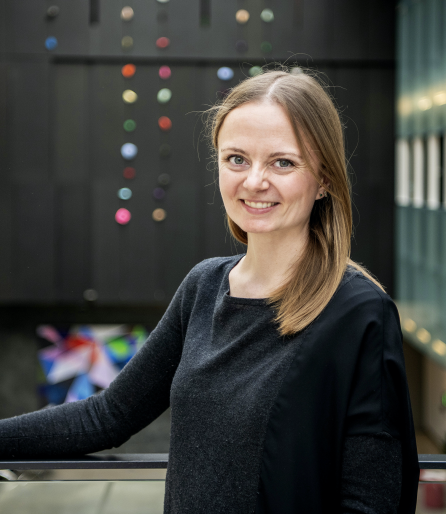
Associate Director, Training Programs
Perimeter Institute for Theoretical Physics
Teaching Faculty
Academic Staff
Training, Educational Outreach and Scientific Programs
Areas of research: Quantum Matter
Overview
Lauren Hayward is a Teaching Faculty member at the Perimeter Institute for Theoretical Physics, and an Adjunct Assistant Professor in the Department of Physics and Astronomy at the University of Waterloo. She received her BSc in Physics and Computer Science from the University of Manitoba in 2011, followed by an MSc in 2012 and a PhD in 2017, both of which are from the University of Waterloo and Perimeter Institute. Lauren works within the field of computational quantum matter physics, and her research interests involve using numerical methods to study phases of quantum many-body systems. She develops academic programs and teaches courses in statistical mechanics, condensed matter theory and machine learning. She is the co-host of the podcast "Conversations at the Perimeter", where she interviews scientists working to unravel the mysteries of the universe.
Teaching Affiliations
Perimeter Institute is committed to diversity within its community and welcomes applications from underrepresented groups. If you are interested in pursuing a MSc degree, please apply to the Perimeter Scholars International (PSI) masters program. If you are interested in working with me, please send me an email at [email protected].
Positions Held
- Teaching Faculty, Perimeter Institute for Theoretical Physics, 2022-present
- Quantum Science Lecturer & Outreach Scientist, Perimeter Institute for Theoretical Physics, 2021-2022
- Adjunct Assistant Professor, Physics and Astronomy, University of Waterloo, 2018-present
- PSI Fellow, Perimeter Institute for Theoretical Physics, 2017-2021
- Resident PhD Student, Perimeter Institute for Theoretical Physics, 2015-2017
- PSI Scholar, Perimeter Institute for Theoretical Physics, 2011-2012
Seminars
- Career Panel, Women in Physics Canada Conference at the University of Manitoba, University of Manitoba, Winnipeg, Canada, 2023/07/07
- Machine Learning Lecture - 230323, Machine Learning for Many-Body Physics (2022/2023), 2023/03/23, PIRSA:23030035
- Machine Learning Lecture - 230321, Machine Learning for Many-Body Physics (2022/2023), 2023/03/21, PIRSA:23030034
- Machine Learning Lecture - 230320, Machine Learning for Many-Body Physics (2022/2023), 2023/03/20, PIRSA:23030040
- Machine Learning Lecture - 230314, Machine Learning for Many-Body Physics (2022/2023), 2023/03/14, PIRSA:23030032
- Machine Learning Lecture - 230309, Machine Learning for Many-Body Physics (2022/2023), 2023/03/09, PIRSA:23030031
- Machine Learning Lecture - 230307, Machine Learning for Many-Body Physics (2022/2023), 2023/03/07, PIRSA:23030030
- Machine Learning Lecture - 230306, Machine Learning for Many-Body Physics (2022/2023), 2023/03/06, PIRSA:23030038
- Machine Learning Lecture - 230302, Machine Learning for Many-Body Physics (2022/2023), 2023/03/02, PIRSA:23030029
- Machine Learning Lecture - 230228, Machine Learning for Many-Body Physics (2022/2023), 2023/02/28, PIRSA:23020018
- Machine Learning Lecture - 230228 pt 2, Machine Learning for Many-Body Physics (2022/2023), 2023/02/28, PIRSA:23030033
- Theoretical Physics for Today and Tomorrow, University of Toronto School of Continuing Studies University Lecture Series, Oakville, Ontario, 2022/11/07
- Courage Under Fire: Dr. Timnit Gebru’s journey from Google to founding the Distributed AI Research (DAIR) Institute, NSERC Chairs for Women in Science & Engineering – Science for Humanity Workshop Series, 2022/10/06